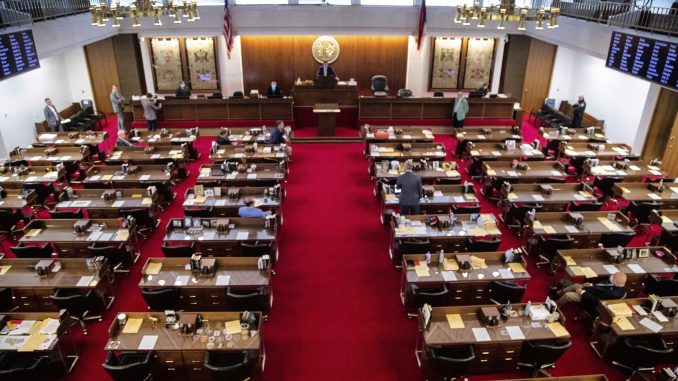
RALEIGH — The North Carolina legislature resumed its annual session on Monday after a two-week break prompted by COVID-19, with lawmakers returning in part to address a state economy and government revenue socked by the pandemic.
The House and Senate held sparsely attended floor meetings before a Senate committee met to scrutinize unemployment benefit delays as massive virus-related layoffs and furloughs have stretched the state’s processing system. While 60% of the 900,000 individuals who have applied for benefits since mid-March have received benefits, senators on the committee heard in person from those who have waited weeks for assistance, their families or employers.
“People just need help. They’re desperate,” said Sen. Todd Johnson, a Union County Republican, pointing out tall piles of paper on his desk, which he said were emails from constituents struggling with the unemployment system.
The lawmakers had left May 2 after giving unanimous support to a $1.6 billion package that distributed nearly half of the COVID-19 funds that North Carolina is receiving from Congress’ chief virus relief law. The Legislative Building, which had been closed to the public for four weeks due health concerns, reopened to visitors Monday.
Building capacity is capped at half of what the fire code allows, and members, staff and visitors were subject to temperature checks before going inside. The House retained for this week its recent operating rules that kept its gallery closed to only the media and staff and allowed members to vote remotely.
“Our citizens have had to make changes to their daily lives,” Senate leader Phil Berger said after removing a surgical mask for a news conference in which reporters complied with social distancing guidelines. “The legislature is no different.”
Still, members of the commerce committee met in person in the adjoining Legislative Office Building, although the proceedings were still aired online.
Both Berger and House Speaker Tim Moore said the General Assembly’s primary job during the session — expected to last at least through the end of June — is to ensure state government can withstand a revenue drop-off during the next fiscal year. The decline could lead to a shortfall as high as $4 billion, according to the leaders.
Cash and other reserves in North Carolina’s coffers should help address the gap for this year and next, Berger said. He’s also hopeful that the federal government will allow legislators to use some of the rest of the state’s share of federal relief funds — another $1.9 billion — to help fill additional gaps. Berger said he wants to avoid the spending cuts, layoffs and furloughs that Democrats had to make during shortfalls during the Great Recession in 2009 and 2010.
During the commerce committee, some outside speakers waiting for unemployment benefits also expressed frustration with Democratic Gov. Roy Cooper, whose administration runs the unemployment office and who issued orders closing businesses and restaurants for dine-in service in March.
While benefit claims application have fallen for four consecutive weeks, Sunday’s applications alone — nearly 7,000 — are still double the weekly amount the division had received before the pandemic. And legislators continue to hear from constituents at their wits’ end. They spoke of waiting hours on the phone to get questions answered, getting knocked off the state’s online filing system or waiting interminably for benefits.
“We just want our jobs back,” said Julie Savage of Wake Forest. She said her husband is a physician assistant who was furloughed in March. She told senators her family would have lost their house had it not been for her husband’s military retirement.
Lockhart Taylor, an assistant commerce secretary who leads the Division of Employment Security, apologized to the speakers for the delays: “I’m sorry for all that you have gone through.”
Taylor said 350 new unemployment benefit agents brought online Monday bring the people employed to handle claims to nearly 2,600. While committee members praised Taylor for his work ethic, several Republicans said Cooper should have given Taylor’s office more time to prepare for a flood of applications before the governor’s executive orders shuttering businesses were announced.



